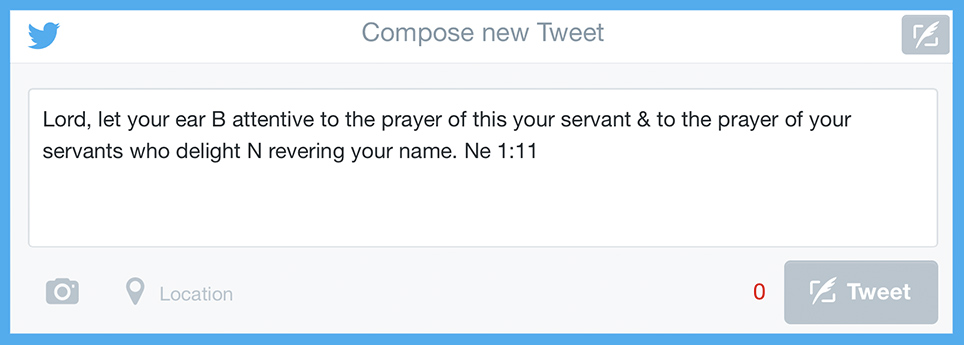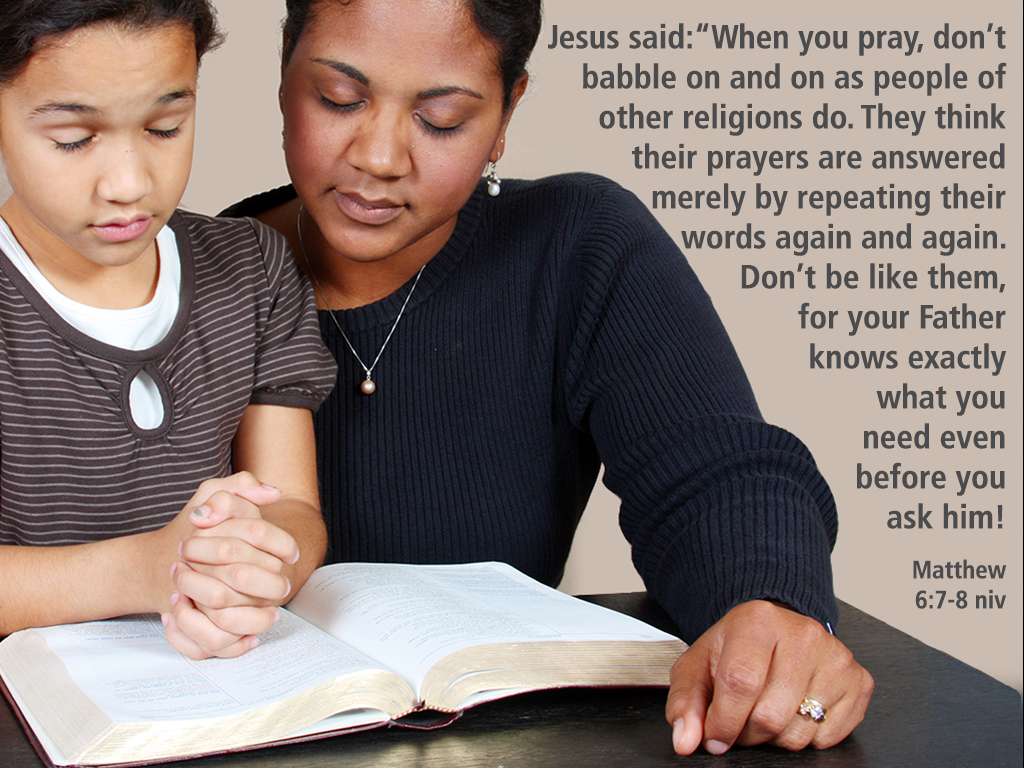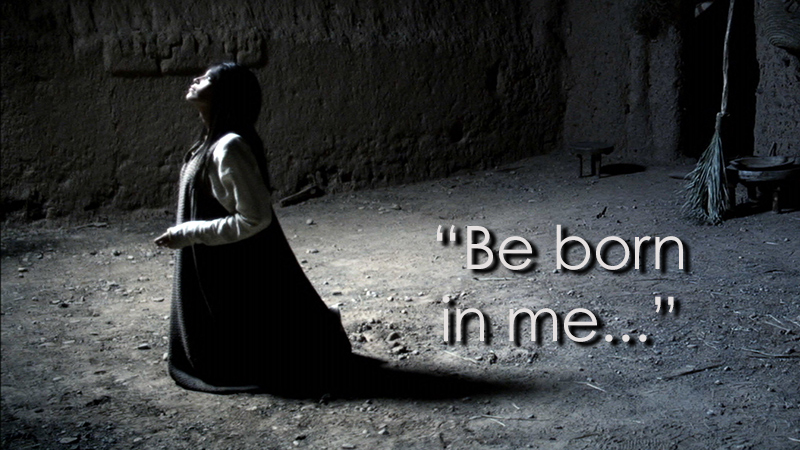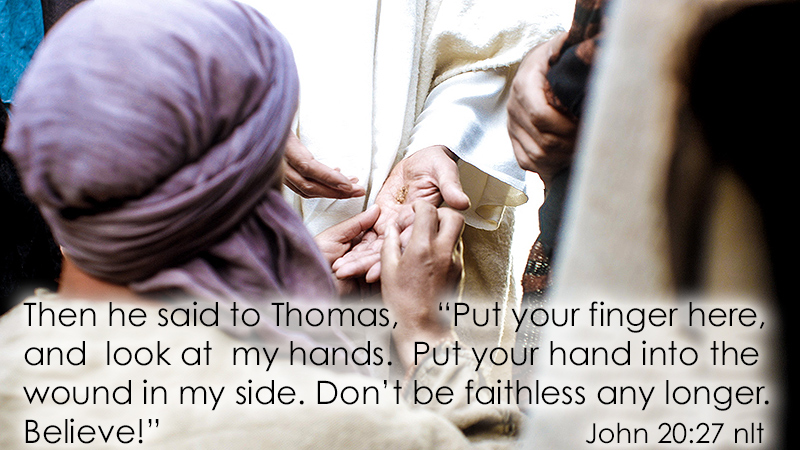Tweeting Heaven

by Phil Ware on October 12, 2015
Category: Two Minute Meditations

“Dad, how about one of your drive-by prayers?” We were in a packed Chuy’s ready to dig into some good Tex-Mex food. She wanted us to take the time to pray, but not be ostentatious about it.
Drive-by prayers are what my family calls my quick, conversational, and situational prayers. I pray these prayers in all sorts of situations.
I hear the siren of the trucks leaving the fire station near our house and I tweet a prayer to heaven: “Father, please be with the men on those firetrucks and the people they are going to serve.”
I’m meeting someone for lunch and before we eat, I say a drive-by prayer without closing my eyes and bowing my head: “Father thank you for this good company and this food. Help us and this time for our good and your glory.”
I meet someone who tells me about a sick relative, and I place my hand on their shoulder and tweet heaven, “O LORD God, please be with this sweet sister in Christ as she has concerns about her husband’s illness. Please bring them comfort and healing in Jesus’ name.”
I’m in a situation with people who are concerned about the health of a friend, and in a pause in the conversation, I say: “Father, we know you heard our conversation of concern for our friend, please bring them healing. We ask this in Jesus’ name.”
I’m in the middle of the woods and the sunrise is spectacular through the rustling leaves and the reflected light off the heavy dew: “O Father, thank you for such a glorious morning and such an incredible world that you created!”
Some might call this kind of prayer part of “praying without ceasing” (1 Thessalonians 5:17 ESV). Others emphasize that this is living in constant awareness of the Father’s abiding presence as the God who will never “leave or forsake” us (Hebrews 13:5 ESV). Maybe in today’s culture we should call it tweeting heaven.
No matter what you want to call it, I believe these kinds of prayers are incubated in the teaching and example of Jesus (See below.). In many ways, they are more like tweets, those 140 character Twitter® messages that have become such an integral part of modern communication. (For those who are older, the memory of Tevye’s talks with God as he walked along in Fiddler on the Roof may be a more recognizable example.)
My favorite biblical example of tweeting heaven is Nehemiah. The seams of Nehemiah’s ministry are stitched together by his prayers. His tweets to “the LORD God of heaven” (Nehemiah 1:5). There are several key things to recognize about tweeting heaven from his example:
- Tweet prayers arise out of a life of committed and disciplined prayer (Nehemiah 1:4-11). They don’t take the place of regular, disciplined prayer; they amplify and expand this prayer time.
- Tweet prayers can stand alone (Nehemiah 5:19) or they can be part of a longer prayer (Nehemiah 1:11).
- They are uttered in the context of reverence and awe for the holiness and majesty of God (Nehemiah 1:5).
- They are conversational and spoken in our natural language (Nehemiah 13:14).
- Tweet prayers are simple and not filled with a lot of formal or religious language (Nehemiah 6:9).
- Tweet prayers are situation: they are tied to the setting and situation of the one praying (Nehemiah 13:9).

Nehemiah’s practice is consistent with what Jesus taught and demonstrated to his first disciples:
And when you pray, do not be like the hypocrites, for they love to pray standing in the synagogues and on the street corners to be seen by others. Truly I tell you, they have received their reward in full. But when you pray, go into your room, close the door and pray to your Father, who is unseen. Then your Father, who sees what is done in secret, will reward you. And when you pray, do not keep on babbling like pagans, for they think they will be heard because of their many words. Do not be like them, for your Father knows what you need before you ask him.
This, then, is how you should pray:
Our Father in heaven,
hallowed be your name,
your kingdom come,
your will be done,
on earth as it is in heaven.
Give us today our daily bread.
And forgive us our debts,
as we also have forgiven our debtors.And lead us not into temptation,
but deliver us from the evil one.
So why not start tweeting heaven?
Why not invite God into the mundane, challenging, and moment-by-moment events of your life by tweeting heaven?
As followers of Jesus, we have the assurance of the Holy Spirit’s help in our prayers (Romans 8:26-27). We have Jesus at the right hand of the throne of grace living to make intercession for us (Hebrews 2:14-18; Hebrews 4:14-16; Hebrews 7:25; Romans 8:34). So let’s use tweet prayers to include our Father in the day-to-day and moment-by-moment events of our lives. We will find that “the Lord is near” (Philippians 4:5) “so that we may receive mercy and find grace to help us in our time of need” (Hebrews 4:16).

A Lifestyle of Repentance
There’s a word for that – it’s called misophonia, the hatred of sound. I am told that it is a neurological disorder that triggers certain negative emotions such as anger or disgust.
One day John the Baptist came preaching what the Bible says was the baptism of repentance for the forgiveness of sin. John pulled on punches. Snakes! Hypocrites!
Being called names like that doesn’t do much for one’s self-esteem. No doubt, for many it was like the sound of a jackhammer. Herod, for one, did not like his message.
And yet for others, they came to hear him share this gospel message because he shared the truth. He offered hope of a coming savior.
Truth is, we are all sinners. There’s an evil within each of us.
Hannah Arendt was a Jewish intellectual, and when one of these great Nazi fiends, Adolf Eichmann, went on trial for his war crimes, she wanted to see him up close. She wanted to see why he could be and what made him so evil.
She wrote about that experience, and she got blasted because she wrote an essay called “Eichmann in Jerusalem: A Report on the Banality of Evil.”
In that essay she said, “You know what? He looks ordinary. He looks just like us. He doesn’t look evil. Do you know what that means? He is just like us.”
Our response is one of horror. No he’s not. But the truth is as Alexander Solzhenitsyn once said. He was at one time a prisoner in the Gulag in the former Soviet Union.
He said, “Gradually it was disclosed to me that the line separating good and evil passes not through states, nor between classes, nor between political parties either — but right through every human heart — and through all human hearts. And even in the best of all hearts, there remains … a … small corner of evil.”
If we’re moralistic, like the Pharisees, we can say, “I’m okay. You’re not okay.” Or if we walk the relativistic grid, we’ll say, “God loves us all just as we are.”
We’re so much like the two boys in Lake Worth, Florida who drew suspensions for eating so much garlic that no one could stand to have them around.
When teachers and students complained about their odor, the boys simply laughed and went on eating garlic. When confronted by school officials, one of the boys protested that the smell couldn’t be all that bad. After all, he pointed out, “We were blowing in each other’s face, and we couldn’t sense a garlic smell.”
John encouraged us to own up to our sin and live a lifestyle of repentance.
And what is repentance? Repentance is literally turning. It’s turning your face towards Jesus and your back towards sin.
Repentance is the act of saying “no” in order that the “Yes” of God may be realized in our lives.
Country comedian Jerry Clower once told about a lady he knew down in Amite County, Mississippi. She lived near a construction site, and workers were putting a tar roof on the building near her house. This lady had sixteen children ”or “young ‘uns” as Jerry would call them. One day she lost one of her children.
She got to hunting him and discovered he had fallen into a fifty-gallon drum of black roofing tar at the construction site. She reached down, hauled him up, took a look at him and shoved him back down in that drum of tar. She said, “Boy, it’d be a lot easier to have another one than to clean you up.”
God must feel that way about some of us sometimes. It would be easier to have another one than to try to clean us up. God doesn’t’ give up on us. He cleans us up. He gives us what we need to make a new start. Because of Christ, we can be forgiven and step out in a new beginning.
Lent is upon us. We are now on a journey towards Holy Week. And, yes, Lent is a time of examination. Lent is a time of repentance. May it be a time for each of us to reconnect with God in new and fresh ways. May it be a time for us to recapture the beauty of God and the triumph we have in Jesus Christ.
Dawn of a New Year

Welcoming the Dawn of a New Year

These are the words of thousands, even millions, of us who look at the New Year and worry if we’re up to the changes that we say we want to make.
Fear of change, uncertainty about opportunities, and worry about the future steal more from us than thieves ever will. There’s just something about our human nature that makes us afraid. We don’t want to lose what we have, so we pull back from anything that might threaten it — even “things” that might be a whole lot better. We fear the consequences of our possible changes. So most of our new year changes are short-lived and mere window dressing.
As Christians, however, we have the power to change without fear. We can reach out and embrace new opportunities with expectation. We can welcome the future with excitement.
You see, God has promised his power to help us change. That power is the Holy Spirit (Ephesians 3:14-21). This Holy Spirit power raised Jesus from the dead (Ephesians 1:17-19). This Holy Spirit power enables us to not only change but also to be transformed to become more like Christ (2 Corinthians 3:18).
While we change, God’s grace assures us that we will not lose the important things in our lives we have gained. As our hearts seek after Jesus as Lord, we can welcome changes and seize opportunities knowing that nothing can separate us from his love for us (Romans 8:31-39). God’s love, Jesus’ presence, and the power of the Holy Spirit will not abandon or fail us (Hebrews 13:5-8).
While some may fear the dawn of the New Year because of the changes it MIGHT bring, we can welcome the dawn of this New Year with anticipation. In this New Year, our Lord Jesus will be at work in us. His will for us and his work in us WILL happen. The real question is this: Are we going to let fear rob Jesus of his goal in us, or will we seize the opportunities and seek the changes that bring him glory?
Let’s welcome the dawn of our New Year with anticipation and courage. Let’s remember the apostle John’s promise, There is no fear in love; but perfect love casts out fear… (1 John 4:18 NASB). Let’s embrace the reassuring words of Jesus to his storm-tossed disciples, “Don’t be afraid. I AM here!” (John 6:20). By the power of the Holy Spirit and with the promise that Jesus is going with us, let’s enter this New Year with faith, confidence, and anticipation.

Finding Jesus: Be Born in Me!

Finding Jesus: Be Born in Me!
by Phil Ware on December 08, 2014
Category: Two Minute Meditations
What does it mean for Jesus to come alive in my heart?
Can Jesus really be real to me?
Can I really know Jesus personally?
Too many people who call themselves Christians settle for less of Jesus, far less of Him, than He wants to give them and be to them. So rather than ignoring these questions, or covering them up with more church stuff, let’s keep asking them until we get some answers… until Jesus is born into each of our hearts!
One of the most moving modern songs about the birth of Jesus and what it can mean to each of us is Francesca Battistelli’s “Be Born in Me” — a song that reminds us that our heart can be a Bethlehem for Jesus to be born in us — see lyrics* to go with the YouTube video that follows.
There is something that grabs our hearts as we think of Mary taking on the wonder and the danger of carrying the Messiah, the Son of God, in her womb and then raising Him as her child. There is also something in our own hearts that can’t escape the yearning of these powerful words:
I’ll hold You in the beginning,
You will hold me in the end
Every moment in the middle, make my heart Your Bethlehem
Be born in me

With Christmas coming and the celebration of Jesus’ birth on so many hearts, many find themselves reminded about the importance of Jesus in their lives. This is especially true of those who once had a more vibrant relationship with the Lord, but now Jesus seems distant or absent. People frequently ask me one of the following questions, or something similar, about this feeling of the Lord’s absence in their lives:
- What can I do to find Jesus in my life again?
- Jesus doesn’t seem real to me right now, so how can I regain my relationship with Him?
- I’ve messed up my life so badly, can I ever find my way back to Jesus?
- While I’ve believed in Jesus, He has never seemed real in my life: can I really have a relationship with Him?
We want to cry out with the song, “Be born in me!”
But can He? Can Jesus really be alive in our hearts?
I am honored to remind disciples of Jesus of several important promises about experiencing Jesus’ presence. But before I share these principles, I want to beg you…
Don’t Give Up!
Don’t settle for less than a walk with the real Jesus in your life! Keep crying out to the Lord, “Be born in me!”
When we are in crisis or can’t seem to find Jesus in our lives, we want an immediate fix. Let’s remember it took awhile to get into the messes in which we find ourselves or it took time for our hearts to grow indifferent to Jesus’ presence. It may take a little time to reclaim that sense of the Lord’s intimate presence. However, the Lord will never forsake us or abandon us (Hebrews 13:5; Romans 8:32-39). Sometimes we can lose sight of His presence in our lives because we have not focused upon Him. However, we must not give in to despair. The Lord is near (Philippians 4:5). He longs to be a part of our lives (Revelation 3:20). So let’s seek after Him and find Him (Acts 17:27). He promises that if we seek Him, we will find Him and He will be real to us (Matthew 7:7-11).
There are two special and interrelated ways to seek after Jesus that I have found can help us, just as they helped many others who have come before us: spend time with Jesus each day in His story and experience Jesus as Immanuel in the ways He promised He would be present with us. This week I want to talk about the first one, then next week we will cover the second.
Spend Time with Jesus
Let’s commit to spend time in the four gospels that tell the story of Jesus’ life. I like to read them in this order: Mark, John, Luke, Matthew. Let’s do this all year, one chapter a day. Before we read the chapter, we can pray something like the following:
Father in heaven, I believe in you, but I need to know Jesus is there for me. So as I read today, have the Holy Spirit open my mind, my heart, and my will to know what Jesus wants me to know today, what He wants me to feel about what I read, and what He wants me to do based on what I have read. Thank you. In Jesus’ name I pray. Amen.
Then we read one chapter — yes, just one chapter each day. Knowing Jesus is like growing any other relationship, it takes a little time to really know the other person well. So doing this daily is important. We shouldn’t rush our time with the Lord in scripture. As we read the appropriate chapter, we will listen for what the Lord Jesus wants us to know from the chapter. There may be several things that are new, but let’s try to hear the one primary thing for us for this day.
Then we go through the chapter a second time, this time focusing on what Jesus wants us to feel about what we have read — does it make me feel motivated, happy, sad, upset, concerned, committed, confused, challenged, angry, convicted, or some other emotion. We don’t have re-read it word for word, but let’s think through what we have read and discover with the Holy Spirit’s help what we believe Jesus wants us to feel about what we have read. Then we think through the message a third time and determine what we believe Jesus wants us to do — what we need to put into practice.
I’ve found that sometimes it’s helpful to ask for Jesus’ help out loud:
“Lord Jesus, what do you want me to know from this passage?” “Jesus, how should what I am reading make me feel about You and the life You have called me to live?” “Lord, what do you want me to do based upon what I read today?”

I’ve also found it helpful to write down what I have heard from the Lord about what He wants me to know, feel, and do. At different times, I have used a little notebook, used my digital calendar, or used the notes app in my phone to record each insight. In previous years, I wrote these insights in the margin of my Bible. For most of us, recording it is more helpful and sticks with us longer than just thinking it in our heads!
Finding time to approach Scripture in this way can be hard when we first begin, especially if the Lord seems distant. The devil will throw out a bunch of distractions and demands. But connecting with Jesus and having Him be real our lives is essential. Our adversary will do everything he can to stop us, discourage us, or make us feel distant from the Lord. However, if we begin to spend regular time with the Lord in His word, we will soon feel more comfortable doing the exercises and the Lord will be more real to us. On top of that, as we speak with Jesus and listen and wait for those things He is showing you then you will recognize that we are not alone as we listen for the Lord to speak to us through His story. He is there and helping us through the Holy Spirit.
Encouraging Your Pastor
Hebrews 13:7, “Remember those who rule over you, who have spoken the Word of God to you”
1 Timothy 5:17, “Let the elders who rule well be considered worthy of double honor, especially those who labor in preaching and teaching”
____________
If you think about it, we definitely have a lot of special appreciation days in our culture. Some of these would be Boss Day, Secretary’s Day, Father and Mother’s Day, Teacher’s Day, and the month of October has been designated as Pastor Appreciation Month. So, have you express appreciation to the Pastor of your church recently? If you haven’t, it’s never too late to say “Thank you” to those in your church, especially your Pastor who faithfully serve the Lord. I’m sure you have heard about booster shots, which are part of a complete program of vaccinations that protect us against threatening diseases.
Moreover, have you ever heard of booster words? Simply put, they are words you say to help others in the fight against discouragement and despair. My brethren, words of encouragement can be “life words” bringing new motivation to a person’s life, especially those faithful pastors, who have been called by God to proclaim His truths to a lost world! Sometime ago I read an article about a church in Colorado that wanted to encourage its pastor by placing a special article in the church newsletter. The author of the paragraph titled it “Boost the Pastor a Bit.”
The article was sent to a print shop, and a typesetter went to work on it. However, when it appeared in the weekly church paper, the headline read, “Boot the Pastor a Bit.” Although we may smile at this humor, many people may feel that way about their pastor. Most pastors take their calling seriously because they recognize they are charged with the awesome responsibility of feeding and teaching the flock of God and overseeing its spiritual welfare. However, there are too many times when the enormity of their task goes unappreciated. Although they aren’t looking for praise, they do need the encouragement of those who are helped by their ministry. The assurance of prayer, a word of commendation, an expression of love – what reinforcement these can give them! Stop and think for a moment of all the influences that have touched your life spiritually. Probably high on your list of those who have contributed to your spiritual benefit would be a godly pastor. Does your pastor need encouragement? If so, look for ways you can give him a boost and not a boot.
____________
Further reflection:
If your pastor faithfully preaches God’s Eternal Word and tries to live an exemplary life, do all you can to support and encourage him? Of course, no pastor is perfect, and sometimes a careful rebuke may be needed (1 Timothy 5:20); however, a pastor carries an enormous responsibility (Hebrews 13:17), and a faithful man of God is worthy of loving respect and generous financial support. Mark Twain once said he could live for a whole month on just one good compliment! So, when was the last time you specifically and purposefully appreciated your pastor? If you haven’t here are a few ways of showing how much you truly appreciate and value him:
(1) Invite your pastor and his wife for dinner or give them a food shower along with gift certificates to their favorite grocery store;
(2) Take your pastor out to lunch to his favorite restaurant;
(3) Write him a hand-written note of appreciation for who he is and how God has used him in your life;
(4) Be present at Bible Studies and prayer meeting, stay awake during sermons, and turn up for training sessions. It is blatantly disrespectful to have your pastor spend so much time in preparation for his message from the Word of God when only to find 10% of the membership present;
(5) Encourage and invest in your pastor’s professional development by sponsoring training, conferences, a book allowance, pastoral exchanges, and sabbaticals. You will benefit greatly from the refreshing exposure your pastor gets. A pastor that isn’t growing will keep the congregation under-nourished;
(6) Let him know that you appreciate the load he carries: the pressure of caring for sheep and the daily sacrifices he makes for the ministry of your church. Convey that you understand he does more than just show up and preach;
(7) Pray for your pastor in that God will protect him spiritually, that he will be empowered by the Holy Spirit, that his ministry will be Christ-centered, that he will have a passion for lost souls, that he will resist temptation and will give glory to God for his ministry;
(8) And please don’t forget your pastor’s wife. She makes as many sacrifices in giving up her husband to ministry opportunities. Send her a note of appreciation, maybe some flowers or a gift certificate. Whatever it is, express your gratitude for the part she plays in the ministry of your local church.
__________
Closing thoughts:
The nature of the service provided by pastors and their families is unique. God has entrusted to them one of the most precious of assignments, the spiritual well-being of His flock. When a pastor becomes ineffective, the very souls of his members are endangered. When eternity is in the balance, we should all be concerned. Pastors and their families live under incredible pressures. They are the ones who perform a wedding one day and possibly a funeral the next. They are the ones who receive phone calls in the wee hours of the night to bring comfort to those in need. They are the ones who may have to make an unpopular decision for the church, but the right decision by God. They are the ones who counsel us during times of trial and comfort us during pain. They are the ones who visit us or a loved one in the hospital.
Furthermore, their lives are played out in a fishbowl, with the entire congregation and community watching their every move. They are expected to have ideal families, to be perfect people, to always be available, to never be down and to have all the answers we need to keep our own lives stable and moving forward. Those are unrealistic expectations to place on anyone, yet most of us are disappointed when a pastor becomes overwhelmed, seems depressed, lets us down or completely burns out. So, my brethren let’s take the time to encourage our pastors, not only during Pastor Appreciation month, but each month throughout the year.
__________
A pastor leads best when his people are behind him.
But One Thing I Do

Not that I have already obtained all this, or have already arrived at my goal, but I press on to take hold of that for which Christ Jesus took hold of me. Brothers and sisters, I do not consider myself yet to have taken hold of it. But one thing I do: Forgetting what is behind and straining toward what is ahead, I press on toward the goal to win the prize for which God has called me heavenward in Christ Jesus (Philippians 3:12-14).
How can I do it? How do I leave behind my past failures where I’ve let others down? How do I overcome the sins of my past? How do I live beyond the grievous wounds left by those intent on hurting me? How do I let go of past ugliness targeted at me, malicious gossip about me, and intentional sins intended to hurt me?
The fatalistic response is sad, “You don’t!”
The flippant response is as simple as it is sarcastic, “How can you not?”
There is truth in this flippant response because if we don’t get past all that stuff from the past we won’t ever get anywhere with our future. There is truth in the fatalistic response because getting beyond our past is very hard for some of us. The sad truth is that so many of us live in the past. We replay past events and ask, “Why did they do this to me?” Or we try to replay the past to figure out what we could’ve done better: “I wonder what would have happened if I had done things differently?” Or worse, we replay the past and play the “if only” game: “I wonder where I’d be today ‘if only’ that hadn’t happened to me?” Or we blame God: “Where was God when this happened? Why did he let this happen to me?”
Too many of us are lost to the future because we cannot let go of something in our past. We allow past rejections to mock us. We allow past failures, betrayals, or wounds to mark our future calendars with built-in melancholy. How do we prevent our past from destroying our future and infecting our present?
Few could rival the apostle Paul for reasons to have regrets. He had persecuted the church, presided over the stoning of Stephen, and dedicated his time and his talents to chasing down Christians to throw them into jail and torture. He was, in his own words, “the worst of sinners” (1 Timothy 1:15-16). He had spent his time getting the highest degree for a Jewish rabbi being educated at the feet of Gamaliel, the greatest of rabbis of his time, or so he thought until he truly met Jesus (Acts 22:3-5). Yet Paul left all of that Jewish achievement behind to become the powerful proclaimer of Jesus to non-Jews all over the Roman Empire. Paul could have focused on those first thirty years of his life as wasted. He even said he considered all that he had achieved as dung, refuse, and garbage compared to knowing Jesus (Philippians 3:1-9). But Paul did not dwell in his past. So how did he do it?
Paul gives us three key phrases to show us how he left his past in the past:
Forgetting what is behind…
Straining toward what is ahead…
Pressing on toward the goal…
Let’s look at each of these three briefly to see if we can get some traction to help us in our struggle to keep the past in the past:
Forgetting what is behind…
Forgetting is hard. Most folks who talk with me come wanting to know how to forget what is behind them. They say they can’t forget. They tell me all the way’s they’ve tried to forget. So what did Paul mean when he said to forget?
Paul didn’t mean these things never crossed his mind. Paul refers to some of these past problems several times in his letters. He reconciles with folks who had failed him in the past, and he includes them in ministry with him again — for example John Mark. However, Paul didn’t let these past things dominate his thoughts, which we will see in the next two strategies of moving beyond the past.
We don’t forget what we keep as our primary focus. We don’t forget what we try to forget. If I kept reminding you to quit thinking about my pink tie with orange polka dots as I spoke to you, then you would not be able to think of anything else but that ugly tie. We can acknowledge our thought about a past event, but we intentionally have to remind ourselves, “I’m not going to let this thought dominate my mind or my heart. I will focus on something else.” Then shift our focus. Our minds need to engage purposefully in some other focus if it is going to let go of our destructive focus. We can get better at this with practice, but catching ourselves and intentionally focusing on something else, with the Spirit’s help, is really the only way to let go of that unwanted thought. Which brings us to…
Straining toward what is ahead…
Paul redirected his focus by moving forward with the work he had at hand. This task could be his daily prayers for churches and church members all over the world as he prayed for them by name. It could have been on his work as a leatherworker and tent maker. It could have been his mentoring of Timothy, Titus, or Silas. It could have been on his letters that he wrote to churches and other believers. Paul had work to do. It was strenuous work. Paul did what was in front of him to do as he also moved in the direction of God’s call and his goals for his life.
Getting ourselves busy doing what we need to do is crucial. Whatever is needed to get us to the next stage of life, job, family, personal growth, professional achievement, or spiritual involvement needs to be done immediately. As we do this, we need to stop the negative self-talk we bring to our work from the past. “You will never amount to anything” “They won’t listen.” “This is wasted effort.” “You will never get this done.” These self-fulfilling prophecies doom us and keep us in the failures of the past. So we have to confront these wrong statements with two actions — not just thoughts.
Our first action is to confront these self-destructive thoughts. Just because we thought them doesn’t mean they are true and that we have to listen to them. I have found that for me, and for others with this problem, going to a mirror and talking to ourselves out loud can be powerfully effective. That message might be something like this: “Phil, you may feel this is true, but it is not true. This problem is the devil trying to keep you mired in the past. Work hard. Offer it to the Lord. Trust he will help you move to a better place. Don’t go back there because the Lord is calling you forward!”
The second action is to get busy doing hard work. Sometimes we can throw our own pity party about the past to help us procrastinate from doing a job we don’t want to do. So by intentionally asking the Lord to help us be effective as we apply ourselves to the job at hand helps us get that job done, gain momentum, and help us move forward. But, that doesn’t mean it is easy. That is why Paul used the word, “straining” and our next key strategy, which begins with the word “pressing”.

Pressing on toward the goal…
Paul’s final focus to move beyond his past is tied to his sense of being called by God for a specific purpose. This effort is a little harder for some folks than others because they are not sure of their calling… or even if they have a calling. Please know this: God has something planned for each of us to accomplish (Ephesians 2:10). We are called to fulfill that purpose (Romans 8:28). He has gifted each of us so that we can live out that purpose (1 Peter 4:10-11). So if you have not done so, ask God to help you identify what he has in mind for you to do with your life. Ask a spiritual friend, mentor, or minister to help you invest yourself in several things until your goal in life is clear. Once you’ve identified that, pursue it.
Any time that the devil drags you back into the past — mistakes, failures, successes, sins, victories — purposely go work on your goal for God. Work hard at it. Set some other things aside. A life-goal is hard work whether it involves passing on faith to children or reaching a place of greater spiritual influence in the lives of others. So press on to accomplish that goal. Recognize delays, defeats, setbacks, and disappoints as part of the spiritual warfare that is taking place to prevent you from getting to God’s goal. Keep pressing on to that goal. Paul put it this way:
I consider my life worth nothing to me; my only aim is to finish the race and complete the task the Lord Jesus has given me… (Acts 20:24).
We are not going to arrive fully at the person or place we want to be in this life. It’s about the journey. But if we keep forgetting what is behind and keep straining toward what is ahead and keep pressing on to our goal, then the past won’t hold us. Life has too much ahead of us to ruin it by dragging our past into our future!

Sing the Jesus Song!
Sing the Jesus Song!
by Phil Ware on July 07, 2014
Category: Two Minute Meditations
When I ask folks what is their favorite book of the Bible, many enthusiastically say, “Philippians!” When I ask them why, they respond, “Because it’s the book of joy!”
The richness of emotion and familiarity in Philippians grabs our hearts. Paul’s exhortation to “Rejoice in the Lord always. I will say it again: Rejoice!” is rooted in what Jesus has done for us and is tied to the true peace that Jesus longs to bring to us (Philippians 4:4-8). Paul’s language of affection for these people he misses is deeply moving and emotionally genuine (Philippians 1:3-8). No wonder so many of us love this little letter.
Yet underneath these words of affection, peace, and joy lurks the reality so many of us face in our churches. Many of the typical problems of any small and struggling church made up of new disciples are behind what we find in this little letter. They were trying to hold up under persecution as Paul, their founding minister, is in prison (Philippians 1:12-26). They found themselves divided by a squabble between two leading women who had led many of them to faith in Jesus (Philippians 4:2-3). In addition, they were facing elitist false teachers who were flashing their religious credentials as proof of their legitimacy when their lives and teaching were out of phase with Jesus (Philippians 3:1-16).
In modern terms, these people were facing…
- Hostile culture on the outside.
- Selfish division on the inside.
- False teachers distorting grace.
This dreaded 1-2-3 punch from the devil knocks many vibrant churches to their knees. How could a small church of new disciples without its key leader survive such an attack? What does Paul do to help them survive? How does Paul help them find joy and peace in the middle of such a mess?
First, he points them to Jesus! He reminds them that they need to invite Jesus back to church!*
Second, he insists that all that they do, say, and think** must be filtered through Jesus and his example.
And the way he does these two things is as simple as it is powerful!
 Paul tells them how to live:
Paul tells them how to live:
Do nothing out of selfish ambition or vain conceit. Rather, in humility value others above yourselves, not looking to your own interests but each of you to the interests of the others. In your relationships with one another, have the same mindset as Christ Jesus… (Philippians 2:3-5 NIV).
Then he reminds them of a song they sing and urges them to live like the Christ Jesus they praise when they sing these words!***
Though he was God,
he did not think of equality with God
as something to cling to.Instead, he gave up his divine privileges;
he took the humble position of a slave
and was born as a human being.When he appeared in human form,
he humbled himself in obedience to God
and died a criminal’s death on a cross.Therefore, God elevated him to the place of highest honor
and gave him the name above all other names,
that at the name of Jesus every knee should bow,
in heaven and on earth and under the earth,
and every tongue confess that Jesus Christ is Lord,
to the glory of God the Father.(Philippians 2:6-11 NLT)
This song gave the Philippian believers a simple “Jesus filter” — something they could use to evaluate everything they thought, taught, and did through the sacrificial example of Jesus. Their doctrines, attitudes, and behaviors could be held up to what Jesus taught, what Jesus did, and why Jesus did what he did. This song would be their reminder that Jesus was more than just a Lord to praise in song, but also the template for the way they were to live their lives.
What Paul did for them, the Holy Spirit has done for us by preserving our favorite little letter of Paul. The joy and peace we seek is found in the Lord we follow as his life of servant-sacrifice becomes the guide for our own lives.
Paul’s “Jesus filter” reminds us that we don’t have right doctrine — no matter how correct theologically we may be — if we treat people in ways that Jesus would never treat them!
Paul’s “Jesus filter” convicts us that we cannot claim to be spiritually mature while looking down on our brothers and sisters as uninformed, ignorant, and beneath us.
Paul’s “Jesus filter” tells us that we can’t legitimately call ourselves followers of Christ and then put our own preferences above the needs of those in our spiritual family.
In other words, Paul tells the Philippians — and us — to invite Jesus back to church. To put all we do and all we teach and how we treat each other through the “Jesus filter” and see how it holds up.
Do we find the same folks wanting to be with us that crowded around Jesus?
This song gave the Philippian believers a simple “Jesus filter”!Do we welcome people into our fellowship and friendship the way Jesus did?
Do we care for people the way Jesus did?
Do we emphasize the teaching of Jesus above our own opinions?
Do we spend our money on the things Jesus invested his life doing?
Do we love each other the way he taught and demonstrated love to his closest disciples?
Do we have the same intimate relationship with the Father that Jesus showed us?
Do we run our interpretations of scripture through Jesus’ teaching and example of ministry?
Do the way we handle our situations in the way that Jesus handled them?
Do we “have the same mindset as Christ Jesus”?
Each congregation, every small group, and each missional community that claims to follow Jesus needs to use this “Jesus filter.” For church plants or for the launch of a missional community or for any group evaluating its mission to bring the Kingdom of God to a broken world, the “Jesus filter” must be front and center in what we do and why we do it. Jesus must become the true North Star we use to align ourselves, our budgets, our teaching, and our treatment of each other with the Father’s will. 
For congregations in transition, using the “Jesus filter” is even more important. Whether the transition is because of the loss of a minister, conflict, outside pressure, loss of joy, decline, or disharmony, Paul’s “Jesus filter” becomes even more crucial.
To use Paul’s words, we are to “have the same mindset as Christ Jesus”!
Let’s sing the Jesus song and then live it!
Images courtesy of Free Bible Images.
** The key thought running as the lifeline through this letter is captured by two key phrases:
- “[T]o be of the same mind in the Lord” found in Philippians 4:2.
- [B]y being “like-minded, having the same love, being one in spirit and of one mind” found in Philippians 2:2.
The root Greek word is phroneow which is found eight times in this short letter: Philippians 1:7; Philippians 2:2(2x); Philippians 2:5; Philippians 3:15; Philippians 3:19; Philippians 4:2; Philippians 4:10. This theme is how Paul puts the Jesus song into play with the introduction, “In your relationships with one another, have the same mindset as Christ Jesus”!
*** Any really quality conservative commentary can give you the background discussion to what is often called “The Christ Hymn” and many date this song to the earliest stages of Christianity found in the early chapters of Acts. The similarity of the themes of the Gospel of Mark and “The Christ Hymn” have also been intriguing, especially the key statement of Jesus: “For even the Son of Man did not come to be served, but to serve, and to give his life as a ransom for many” (Mark 10:45). The humble service of the foot washing Jesus (John 13:1-17) and the radical death on the cross Jesus (John 19:1-30) we see in the Gospel of John and in John’s teaching on loving each other (1 John 3:16-18) is also striking! These examples are clearly reminders of the truth, importance, and power behind singing and living the truth of the Jesus song!
When the way out is through

When the Way Out Is Through
Most folks are at least a little familiar with the LORD‘s* deliverance his people from the Egyptian army through the Red Sea. Many folks have seen the old Charlton Heston movie, “The Ten Commandments” since it is on TV most Easter weekends. Several new generations have been re-acquainted with the story through “The Prince of Egypt” that was seen by kids, parents, and grandparents. This great story of deliverance is a reminder that God will see us through when we reach one of those difficult times in life. When there is no way out or around our problems, the LORD will help us find a way through those problems.
Here’s the story in a nutshell. Israel is stuck between the Red Sea and Pharaoh’s army of soldiers and their charioteers on their back side. The Red Sea blocks their way from going forward (Exodus 14:5-12). They have every right to be afraid because Pharaoh’s charioteers were feared by the armies of all other nations. The Israelites were untrained for war, having been slaves for 400 years. All Israel had to lead them into battle was an 80-year-old shepherd with a stick! So if deliverance was going to come for God’s people, their obedience and the LORD‘s grace and power would have to produce it. That is exactly what happened.
God’s deliverance involved five incredible steps of grace and power:
- God’s presence in the pillar of fire and the cloud moved from in front of the people to their rear to protect them (Exodus 14:19-20)
- Moses obeyed the LORD and stretched out his staff over the waters. God then parted the waters and dried the land in between with an east wind (Exodus 14:21).
- The Israelite people passed safely between the wall of waters on dry ground to the other side (Exodus 14:22).
- The presence of God in the pillar of fire and the cloud confused the Egyptians as they tried to pursue the Israelites through the sea. Their wheels jammed in the mire of what had been dry ground further adding to the confusion (Exodus 14:23-25).
- When Moses obeyed and stretched his staff over the waters a second time, the waters buried and destroyed the army of Pharaoh (Exodus 14:26-28).
This great story of deliverance is a powerful reminder to us as a people and as individual disciples that the LORD will make a way through for us when there seems to be no way! God’s gracious and powerful presence will lead us, accompany us, and protect us until he gets us safely to where he wants us to be. This is great news. This is an incredible promise — one that God’s people put to music in the celebration song after their great victory:
In your unfailing love you will lead
the people you have redeemed.
In your strength you will guide them
to your holy dwelling (Exodus 15:13).
This is our story. It is not just a Bible story. This story reminds us of the character and courage that is in our spiritual DNA. We have the same God with the same power today as those people had in their day. We have the same promise that the LORD will get us to our destination (Philippians 1:6). Yet the nagging doubt and repeated complaint that I hear goes something like this:
Yeah, Israel only had an 80-year-old shepherd with a stick to lead them into battle, but that old shepherd was Moses. We don’t have anyone near the leadership quality of Moses. So it’s hard for me to wait or to follow or to trust when our leaders don’t seem to have it together. There doesn’t seem to be a plan. If our leaders have one, they sure don’t seem to be executing it!
 That’s why after reading this story from the Bible many times, what I found this last time was so unexpected and powerful — something that I seemed to have missed. Moses didn’t know God’s plan! What Moses first told God’s people to do was only half right. Yet while he didn’t know the LORD‘s plan, he knew the LORD! While he didn’t know the way the LORD was going to deliver his people, he did know to obey the LORD in all that he asked:
That’s why after reading this story from the Bible many times, what I found this last time was so unexpected and powerful — something that I seemed to have missed. Moses didn’t know God’s plan! What Moses first told God’s people to do was only half right. Yet while he didn’t know the LORD‘s plan, he knew the LORD! While he didn’t know the way the LORD was going to deliver his people, he did know to obey the LORD in all that he asked:
As Pharaoh approached, the Israelites looked up, and there were the Egyptians, marching after them.
They were terrified and cried out to the LORD….
Moses answered the people, “Do not be afraid. Stand firm and you will see the deliverance the LORD will bring you today. The Egyptians you see today you will never see again. The LORD will fight for you; you need only to be still.”
Then the LORD said to Moses, “Why are you crying out to me? Tell the Israelites to move on. Raise your staff and stretch out your hand over the sea to divide the water so that the Israelites can go through the sea on dry ground (Exodus 14:10-16).
What Moses told the people was only half correct. God would work deliverance, and the pursuing army would be destroyed. Moses was also half wrong! The people were not to stand still and wait. They were to advance toward God’s future following Moses’ lead. They were to let the LORD handle the deliverance part, and they were to obey the LORD‘s call to cross the sea!
What do we do when there is no way around or past our problems and challenges? We go through them trusting the LORD will sustain, empower, and guide us!
But our leaders are not Moses! Yes, but our assurance isn’t based upon having a Moses. Our assurance is based upon ours leaders being committed to obey the LORD even if they don’t know the way through what they are facing.
Sometimes the only way out or around our challenges is for us to go through them. In the middle of our fearful journey, let’s remember that deliverance is the Lord’s work. Obeying is ours!
 |
This image was a concept image by Paul Lasaine for the movie “Prince of Egypt” See more on Pinterest.
|
For further thought:
This is the apostle Paul’s take on deliverance. Notice the principles that are similar in both Moses and Paul. What are the differences?
For a disciple of Jesus, deliverance is even more comprehensive than with Moses and the the children of Israel. Jesus’ defeat of death guarantees us deliverance no matter what happens to us!
Yes I will continue to rejoice, for I know that through your prayers and God’s provision of the Spirit of Jesus Christ what has happened to me will turn out for my deliverance. I eagerly expect and hope that I will in no way be ashamed, but will have sufficient courage so that now as always Christ will be exalted in my body, whether by life or by death. For to me, to live is Christ and to die is gain. If I am to go on living in the body, this will mean fruitful labor for me. Yet what shall I choose? I do not know! I am torn between the two: I desire to depart and be with Christ, which is better by far; but it is more necessary for you that I remain in the body. Convinced of this, I know that I will remain, and I will continue with all of you for your progress and joy in the faith, so that through my being with you again your boasting in Christ Jesus will abound on account of me (Philippians 1:19-26)
* When the term “the LORD” is used in this article, it is referring to YAHWEH, the covenant and personal name God gave for his people to call him forever (Exodus 3:14-15).
Freedom
 Freedom is what we’ll celebrate with parades and fireworks this July. Freedom is what makes this Nation so unique. Our freedom of religion allows us to gather and worship without fear of reprisal unlike so may other countries.
Freedom is what we’ll celebrate with parades and fireworks this July. Freedom is what makes this Nation so unique. Our freedom of religion allows us to gather and worship without fear of reprisal unlike so may other countries.
We all remember Thomas Jefferson’s lines describing our “inalienable right” to “life, liberty and the pursuit of happiness”.
Despite the imperfections and foibles of our political system, I still love my country.
When I go out to the ball park I put my hand over my heart or take off my hat as the national anthem is sung.
I love the flag which flies over our land. I’m not ashamed of it. I find no reason for removing it from public places because it might offend someone from another country.
I love America, and I believe as the early Puritans and past Presidents said, “America is a shining city upon a hill whose beacon light guides freedom-loving people everywhere.”
Over two-hundred and fifty years ago, at the onset of the First Great Awakening, a time of remarkable spiritual revival in America, Edwards preached a sermon from Matthew 5:14 to his congregation in Northampton, Massachusetts, entitled, “A City on a Hill.”
In that sermon, he describes the marks of a church that is a city on a hill. I think those same marks would determine if we as a nation are also a city on a hill.
Edwards identifies three marks of a city on a hill:
1. A church is a city on a hill if it has a distinct faith. In spite of those who would suggest otherwise we as a nation have very distinct leanings in terms of our Christian faith.
2. A church is a city on a hill if God has done something distinct in it. Here Edwards is asking whether God has been at work in an unusual way within the life of the church/or nation. Is there evidence of God’s hand of blessing in the life of the church? Wouldn’t you say that throughout the years we as a nation have been blessed.
3. A church is a city on a hill if it, or any of its members, has a distinct influence on others. “A professing society,” writes Edwards, “is sometimes a city set on a hill on that account, by reason of the great and extensive influence that they have, or what is seen in them or heard of them has, on others” (p. 544). In a word: impact.
Has our nation had a significant impact on others? I believe so. We have stood at the forefront for freedom. We have fought and thousands have died in their fight for freedom. We have been at the forefront of the war of terrorism while others have watched.
But I am also reminded by John Winthrop aboard the Arbella in 1630 said, “if we shall deal falsely with our God in this work we have undertaken, and so cause Him to withdraw His present help from us, .. and we shall be made a story and a by-word through the world.”
You see, it has often been said that nations follow a cycle. They go from:
bondage to spiritual faith;
from spiritual faith to great courage;
from courage to liberty;
From liberty to abundance;
from abundance to selfishness;
from selfishness to complacency;
from complacency to apathy;
from apathy to dependency;
from dependency back to bondage.
I hope I never live to see our nation in bondage. I hope my kids or grandkids never live under the rule of another country.
Likewise, I think about our church. Are we having an impact on our nation and community?
Dietrich Bonhoeffer was a pastor who was incarcerated during WWII Germany. He insisted, “Those who are baptized no longer belong to the world, no longer serve the world, and are no longer subject to it. They belong to Christ alone, and relate to the world only through Christ.”
While he lost his life a few months before the war ended, Bonhoeffer continues to have a great impact on believers everywhere. I would challenge you to read some of his works.
Throughout the month of July we will be looking at our church’s impact. Are we living as salt and light in our community? Are we turning our world upside down? Are we sharing our faith story with an unbelieving generation?

I am not ashamed to be called an American. Above all, I am not ashamed to be called a Christian. I am not ashamed of the gospel for it is the power to transform broken lives and make them new.
Again, remember the words of Jesus who said, “You are the light of the world. A cit that is set on a hill cannot be hidden. Let you light so shine before men, that they may see your good works and glorify your Father in Heaven.”

![]()
Lent
March is upon us. Some of us thought it would never get here. The snow has been depressing to many. We wondered, when is it ever going to stop, and yet what a wonderful introduction to Spring and to the season of Lent.
Just as Lent is a time of repentance, of reflection and introspection, the snow reminds us “Come now, let us settle the matter,” says the LORD. “Though your sins are like scarlet, they shall be as white as snow; though they are red as crimson, they shall be like wool. (Isaiah 1:18)
Throughout the season of Lent, we’ll be looking at the iPhoto album of Jesus. What wonderful snapshots we see when we explore the gospels and see Jesus interacting with those who were outcasts, lonely, frustrated, and dejected.
I want to challenge you to get involved in a Lenten small group of 2-3 individuals and spend time reflecting on the passages which will be the basis of our messages. It might be 2-3 families who get together but wherever and whenever you meet, why not give it a try. There will be a weekly bulletin insert, which can help guide you through this process. It doesn’t have to be long. A half-hour to hour depending on how your group would be structured is sufficient.
The Psalmist said, “Consider the love of God…” (Psalm 107) The Apostle Paul said, “O the depth of the riches and wisdom and knowledge of God!” (Romans 11:33) God’s love is deep enough to come from highest heaven and to reach the lowliest of sinners.
In 1914, British explorer Ernest Shackleton and his crew took a ship to Antarctica. Their plan was to land, walk across Antarctica, cross over the South Pole, and continue all the way across. The plan had to be abandoned because their ship, the Endurance, got caught in polar ice and was crushed.
Over the following months they fought to stay alive. One of his biographers said that of all the difficulties they faced—including starvation and frigid temperatures—the worst thing was darkness. Near the South Pole, the sun goes down in mid-May and doesn’t come up until late July. There’s no daylight—no sunlight—for more than two months.
Darkness! It can drive people mad. You can’t see forward and you can’t see behind you. You have no direction. You can’t even see yourself. You don’t know what you look like. You can’t tell who is around you, whether they’re friend or foe.
It brings disorientation and confusion.
So, too, does spiritual darkness. Spiritual darkness comes when we turn away from God as our true light and make something else the center. You see, we were made to orbit around God.
When we are in spiritual darkness, however, we may feel our life is headed in the right direction, but we are wildly disoriented. If anything is more important to us than God, we have a problem with direction.
We lose our identity. We become isolated.
Lent is a time to refocus, to reorient ourselves to the cross.
The first person to get reoriented around the cross was a Roman centurion! His confession as he witnessed the crucifixion of Jesus was, “Surely, this man was the Son of God.” A centurion! A Roman soldier. A hardened man who had seen hundreds put to death.
All throughout his life people had been asking, “Who is this man?” The centurion now got it.
He heard Jesus’ cry and saw how He died. Surely, he saw the character, the love of Jesus shining through the darkness, and it flooded him with light, with the love of God.
I think of the gospel song:
Twas a life filled with aimless desperation
Without hope walked the shell of a man;
Then a hand with a nailprint stretched downward,
Just one touch then a new life began.
The chorus says,
And the old rugged cross made the difference
In a life bound for heartache and defeat;
I will praise Him forever and ever
For the cross made the difference for me.
This is our message to the world today, and it is God’s message to you. The cross is God’s provision for your sin. If you go to the cross, you will find your way home to God. That’s what Lent is about. That’s what the gospel is about.


